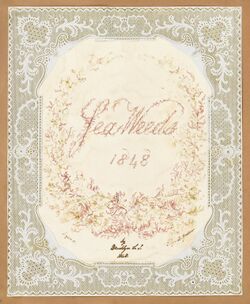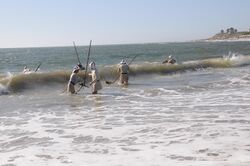Biology:Seaweed collecting
Seaweed collecting is the process of collecting, drying, and pressing seaweed. It became popular as a pastime in the Victorian era and remains a hobby today.[1]
History of seaweed collecting
Collecting seaweed can be traced back to at least the 17th century with the pressings found in Hans Sloane's Herbarium.[2]
The pastime became increasingly popular during the Victorian Era, where it played to the burgeoning interest in natural history and collection in general. It was especially fashionable with young women, as it allowed a greater level of personal freedom.[3] Indeed, it was so in-style that, as a young girl, Queen Victoria created her own seaweed album. The materials needed for the hobby became readily available at seaside shops.[4] These activities also afforded women the opportunity to display their understanding and appreciation of the natural world.[5]
Anna Atkins, thought to be the first female photographer, published the first book using photographs as illustrations. This was Photographs of British Algae: Cyanotype Impressions and contained pictures of seaweed.[6]
The actions of some of the collectors earned them recognition and admiration from their male, professional counterparts.[7]
These Victorian collections form valuable historical resources[8] for morphological studies and from which genomic DNA can be extracted.[9]
Seaweed collecting equipment
In his 1881 book, A.B. Hervey recommended the following equipment for collecting and pressing seaweed.
You should have a pair of pliers; a pair of scissors; a stick like a common cedar "pen stalk," with a needle driven into the end of it, or, in lack of that, any stick sharpened carefully; two or three large white dishes, like "wash bowls" botanist's "drying paper;" or common blotting paper; pieces of cotton cloth, old cotton is the best; and the necessary cards or paper for mounting the plants on.[10]
See also
References
- ↑ Shady, Beth (April 20, 2011). "The Process". SeaweedArt.com. http://seaweedart.com/2011/04/the-process/.
- ↑ "The Sir Hans Sloane Herbarium". Natural History Museum. http://www.nhm.ac.uk/research-curation/scientific-resources/collections/botanical-collections/sloane-herbarium/.
- ↑ "Mystery surrounds Victorian lady seaweed collector". Whitby Gazette (Johnston Press plc). October 22, 2013. http://www.whitbygazette.co.uk/news/local/mystery-surrounds-victorian-lady-seaweed-collector-1-6910465.
- ↑ Logan, Thad (2001). The Victorian Parlour: A Cultural Study. Cambridge Studies in Nineteenth-Century Literature and Culture. 30. Cambridge University Press. ISBN 9780521631822. https://books.google.com/books?id=zKO-q64xkY8C. Retrieved October 23, 2014.
- ↑ Laura Massey. "Nature Domesticated: A Victorian Seaweed Scrapbook". Peter Harrington, London. http://www.peterharrington.co.uk/blog/a-victorian-seaweed-scrapbook/.
- ↑ "Catalogue of Photographically Illustrated Books". The British Library. http://www.bl.uk/catalogues/photographyinbooks/record.asp?RecordID=3048.
- ↑ Olsen, Penny (2013). Collecting Ladies: Ferdinand Von Mueller and Women Botanical Artists (1 ed.). National Library of Australia. pp. 15. ISBN 9780642277534. https://books.google.com/books?id=STX1swnuL3AC. Retrieved October 23, 2014.
- ↑ Moore, P.G. (2008). "A 150-year-old seaweed collection returns to Cumbrae". The Glasgow Naturalist (Glasgow: Glasgow Natural History) 25 (1): 3–8. http://www.glasgownaturalhistory.org.uk/gn25_1/moore_150yrold_seaweed.pdf. Retrieved October 23, 2014.
- ↑ Huxley, Rob; Bryant, Jenny. "How to Prepare Seaweed Specimens". The Society for the Preservation of Natural History Collections. http://www.spnhc.org/media/assets/How_To_2.pdf.
- ↑ Hervey, A.B. (1881). Sea Mosses: A Collector's Guide and an Introduction to the Study of Marine Algae. Boston: Estes and Lauriat. pp. 19. https://archive.org/stream/seamossescollect001herv#page/n11/mode/2up.
External links
- Digitised seaweed collections at the Brooklyn Museum
 |



